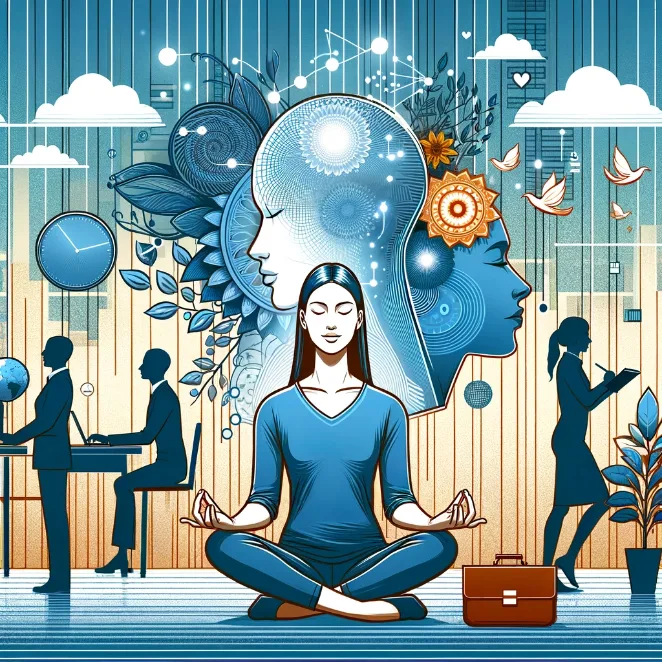
Enhancing Relationships Through Meditation
Relationships are the cornerstone of our lives, shaping our emotional well-being and overall happiness. Whether it's a romantic partnership, a friendship, or family ties, the quality of our connections profoundly impacts our lives. In this fast-paced, interconnected world, maintaining and nurturing healthy relationships can be a challenge. This is where meditation, with its profound ability to foster self-awareness and emotional intelligence, steps in. In this article, we will explore how meditation can be a powerful tool for improving relationships, offering insights and techniques to strengthen the bonds we share with others.
article by Hina Kurosawa
Cultivating Self-Awareness
The Foundation of Healthy Relationships
The journey to improving our relationships begins with self-awareness. Meditation, at its core, encourages introspection and self-exploration. By regularly meditating, we develop a heightened awareness of our thoughts, emotions, and behaviors. This self-awareness is the key to understanding our patterns of interaction with others.
Through meditation, we can uncover deep-seated insecurities, fears, and past traumas that may be affecting our relationships. By acknowledging these inner struggles, we can work on healing and personal growth. This newfound self-awareness enables us to approach relationships with authenticity and vulnerability, two essential ingredients for meaningful connections.

Cultivating Self-Awareness
The Foundation Of Healthy Relationships
The journey to improving our relationships begins with self-awareness. Meditation, at its core, encourages introspection and self-exploration. By regularly meditating, we develop a heightened awareness of our thoughts, emotions, and behaviors. This self-awareness is the key to understanding our patterns of interaction with others.
Through meditation, we can uncover deep-seated insecurities, fears, and past traumas that may be affecting our relationships. By acknowledging these inner struggles, we can work on healing and personal growth. This newfound self-awareness enables us to approach relationships with authenticity and vulnerability, two essential ingredients for meaningful connections.
Managing Stress & Reactivity
Finding Calm Amidst Turbulence
Stress and reactivity are common culprits that erode the harmony in relationships. Daily life is filled with stressors, and it's easy to bring that stress home or project it onto our loved ones. Meditation equips us with tools to manage stress more effectively.
Mindfulness meditation, in particular, teaches us to observe our thoughts and emotions without judgment. This non-reactive stance allows us to respond to challenging situations with greater composure. In moments of tension or conflict, we can pause, take a deep breath, and choose our responses consciously rather than impulsively reacting out of anger or frustration.

Fostering Connection & Intimacy
Nurturing Bonds
At its core, meditation is about cultivating connection—with ourselves and the world around us. This sense of connection can significantly enhance our relationships. When we meditate regularly, we become more present and attentive in our interactions with loved ones.
Quality time with a partner or loved one takes on new meaning when we are fully present. We can savor the moment, engage in deep conversations, and create cherished memories. This heightened presence and attentiveness lead to greater intimacy and connection in our relationships.
Communication & Conflict Resolution
Harmonizing Through Mindful Communication
Effective communication is the lifeblood of any healthy relationship. Meditation can sharpen our communication skills by fostering active listening and clear expression of thoughts and feelings.
Through mindfulness meditation, we learn to be fully present when someone is speaking, rather than mentally formulating our response. This leads to a deeper understanding of their message and reduces the chances of misunderstandings. Additionally, meditation can help us choose our words more thoughtfully, preventing hurtful or reactive responses during disagreements.

Patience and Letting Go
Releasing Grudges and Resentment
In any long-term relationship, there are bound to be moments of frustration, disappointment, and conflict. Holding onto grudges and resentment can poison a relationship over time. Meditation can be a powerful antidote to these negative emotions.
By regularly practicing mindfulness, we become more adept at letting go of past grievances and forgiving both ourselves and others. This release of emotional baggage lightens the emotional load within a relationship, allowing for more freedom, joy, and spontaneity.
The Art of Relational Mindfulness*
Meditation is not a panacea for all relationship challenges, but it is a potent tool for personal growth and improving the way we relate to others. By cultivating self-awareness, compassion, and empathy, managing stress, fostering connection, honing communication skills, and practicing patience and forgiveness, we can enhance the quality of our relationships. Ultimately, meditation is an invitation to practice relational mindfulness—an ongoing journey of deepening connections and nurturing the bonds that enrich our lives.
Published: 12/1/2023
Modified: 12/1/2023
More predictions
Come back here soon to learn more about yourself and your future


Meditation & Lucid Dreaming
The realms of meditation and lucid dreaming are both profound and mystical in their own right. Meditation, with its deep introspection and self-discovery, and lucid dreaming, where the dreamer becomes conscious within the dream, offer unique gateways to explore the enigmatic world of the unconscious mind. In this article, we embark on a journey to understand the intricate connection between meditation and lucid dreaming, exploring how they complement each other, and how these practices can lead to profound insights into the deepest layers of our consciousness.


The Dance Of The Mind & Body
Ballet is often described as the art of defying gravity, where dancers seem to float effortlessly across the stage. Achieving this illusion requires an extraordinary level of mind-body coordination and awareness. Meditation, with its emphasis on mindfulness, can be a transformative tool for ballet dancers.


Mindfulness For Life Coaches & Counselors
Life coaches and counselors play a pivotal role in guiding individuals through personal and emotional challenges. As the demands of modern life continue to increase, the need for effective tools and techniques to support mental well-being has become more critical than ever. One such tool that has gained significant recognition in the realm of coaching and counseling is mindfulness. In this article, we will explore the profound benefits of mindfulness for life coaches and counselors, shedding light on how this practice can enhance their effectiveness in helping clients navigate the complexities of life.